China Animals
The ABCs of Weibo 2021: These Were the Biggest Trends on Chinese Social Media
From Alaska Talks to Zheng Shuang, these were the biggest Weibo trends of 2021.
Published
4 years agoon

PREMIUM CONTENT ARTICLE
What were the most discussed topics on Weibo of 2021? Here is an overview of top stories on Chinese social media from A to Z: a look back at the biggest trends on Chinese social media in 2021.
This is the “WE…WEI…WHAT?” column by Manya Koetse, original publication in German by Goethe Institut China, visit Yi Magazin: WE…WEI…WHAT? Manya Koetse erklärt das chinesische Internet.
The year 2021 has been quite a tumultuous one on Chinese social media. It was not just Covid19 that was among the biggest trends once again, it was also a year in which the 100th anniversary of the Communist Party, heightening tensions with the U.S., and national disasters such as the floods in Henan played a major role. But besides all the big topics, there were many smaller topics that became the biggest.
To give you more insight into the topics that went trending this year and which were most discussed by Chinese netizens, we have compiled this list of Weibo trends for you, from A-Z.
A is for: Alaska Talks
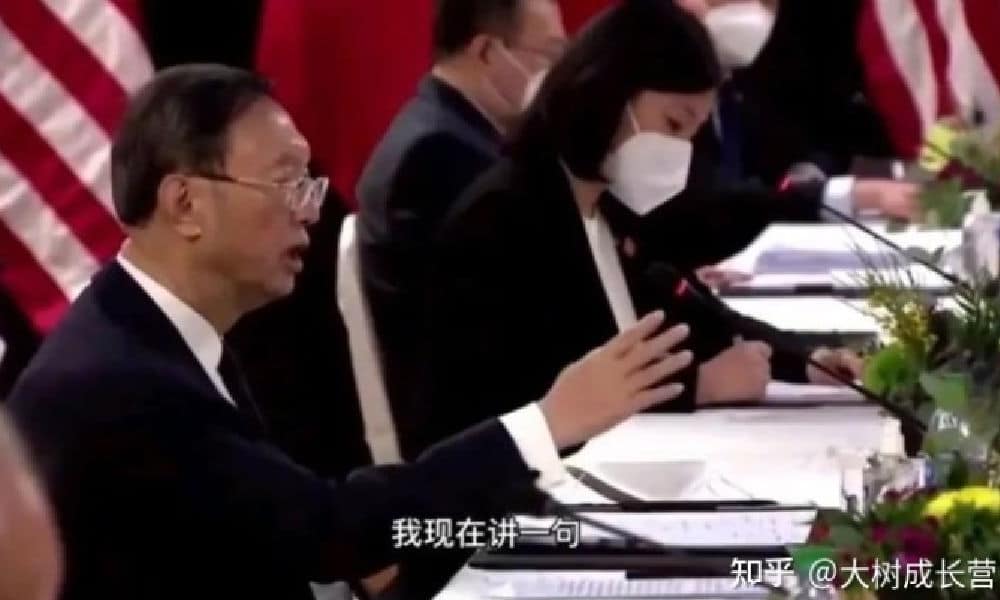
The U.S.-China strategic talks in Anchorage were a big topic of discussion on Chinese social media in March of 2021. It was the first major face-to-face U.S.-China meeting of the Biden administration, and due to the sometimes-angry words exchanged between the two sides, some called the Alaska talks a “diplomatic clash.”
While international media focused on the meeting and what their outcome meant for Sino-American relations and the foreign strategies of China and the U.S., many Weibo users instead focused on interpreter Zhang Jing (张京) who fiercely took notes while top diplomats Wang Yi (王毅) and Yang Jiechi (杨洁篪) were talking and flawlessly managed to translate their lengthy speeches.
Another moment that went viral online was when Yang Jiechi remarked he had instant noodles for lunch. Chinese state media outlet CGTN published a short video showing the Chinese State Councilor and Foreign Minister Wang Yi and Yang right before entering a session of the high-level talks, with Wang asking Yang “Have you had lunch?”, and Yang then answering: “Yes, instant noodles.”

‘Noodle gate’ went trending as a sign of American lack of etiquette: no formal dinner was arranged for the Chinese diplomats, and even with Covid19 restrictions, many netizens thought the Americans could and should have done more to accommodate their Chinese guests.
B is for: Battle at Lake Changjin

The Chinese blockbuster Battle at Lake Changjin that hit cinemas in the fall of 2021 became one of China’s highest-grossing films ever, breaking all kinds of box office records. The movie provides a Chinese perspective on the start of the Korean War (1950-1953) and the unfolding of the battle of Chosin Reservoir, a massive ground attack of the Chinese 9th Army Group against American forces.
The movie was a major topic on Chinese social media this year, not just because of its unparalleled budget, all-star cast, and production team, but also because its specific narrative of China’s ‘glorious victory’ at Chosin resonates with many Chinese in a time of growing nationalism and heightening international tensions.
Many social media users showed how emotionally engaged they were in the film by sharing their watching experience and posting photos and videos of their cinema visit. Some netizens even consumed frozen potatoes while watching the film as a sign of solidarity for the Chinese soldiers at the front for whom frozen potatoes were all they had to eat. Other filmgoers even saluted to the screen to honor those who lost their lives during the battle.
Read more about this topic here in English or in German.
C is for: Call me By Fire
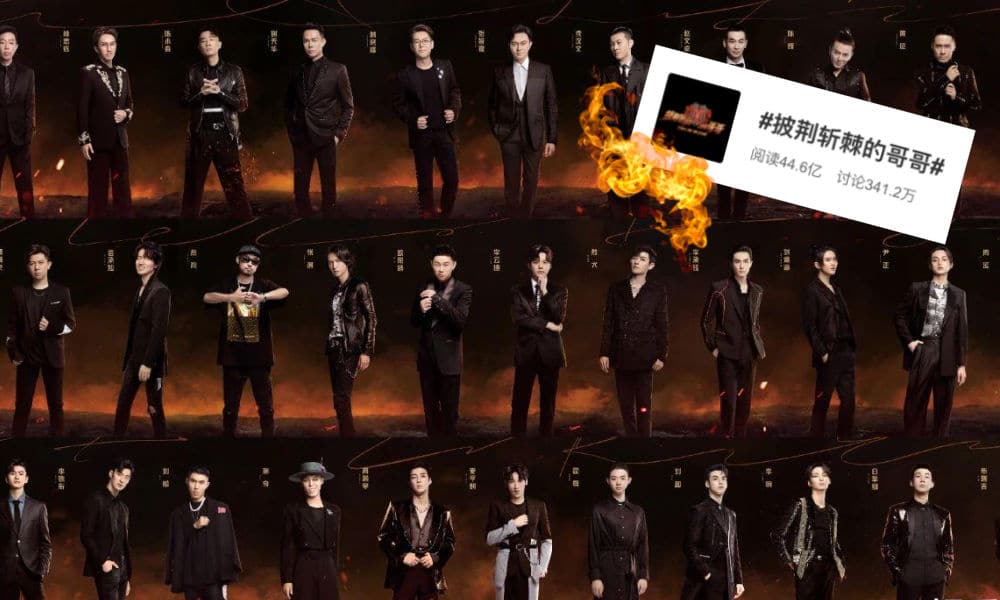
The all-male reality show Call Me By Fire (披荆斩棘的哥哥) was one of this year’s hit shows, with one Weibo hashtag dedicated to the show receiving a staggering 12 billion views.
Call Me By Fire featured 33 male celebrities, and the show received a lot of attention for various reasons. Participant Li Chengxuan (李承铉/ Nathan Lee) triggered discussions by speaking up about being a full-time father and suffering from depression. The 55-year-old Taiwanese singer Terry Lin Zhixuan (林志炫) was also a contestant and fell off the stage while filming. Another celebrity on the show, Chinese singer Huo Zun (霍尊), withdrew after his ex-girlfriend accused him of being a cheater and leaked WeChat conversation screenshots to prove that he actually disliked the show.
The Cantonese-speaking celebrities who were on the show also caused a social media sensation, contributing to an increased social media interest in the Greater Bay Area.
D is for: Dearest

The Chinese film Dearest (亲爱的) from 2014 received attention in 2021 again after a real-life development took place in the story that was the main inspiration behind the film.
Dearest is centered around a divorced couple in Shenzhen dealing with the disappearance of their son. The movie is partly based on the true story of Sun Zhuo, who was abducted in 2007 at the age of 4. His parents never gave up hope they would see him again and sacrificed everything to be able to fund their search efforts.
After a years-long search, Sun was finally found in 2021 due to the help of authorities and face recognition technology that helped trace the person suspected of abducting him. But in a perhaps unexpected twist, Sun stated that he would prefer to stay with his adoptive parents, who had raised him for over 10 years.
The story triggered many online discussions and raised more awareness on the issue of abducted children in China in times of the country’s one-child policy. Sun’s father spoke to the media saying: “For 2022, my biggest wish is that all the abducted children can finally be found.”
E is for EDG Championship
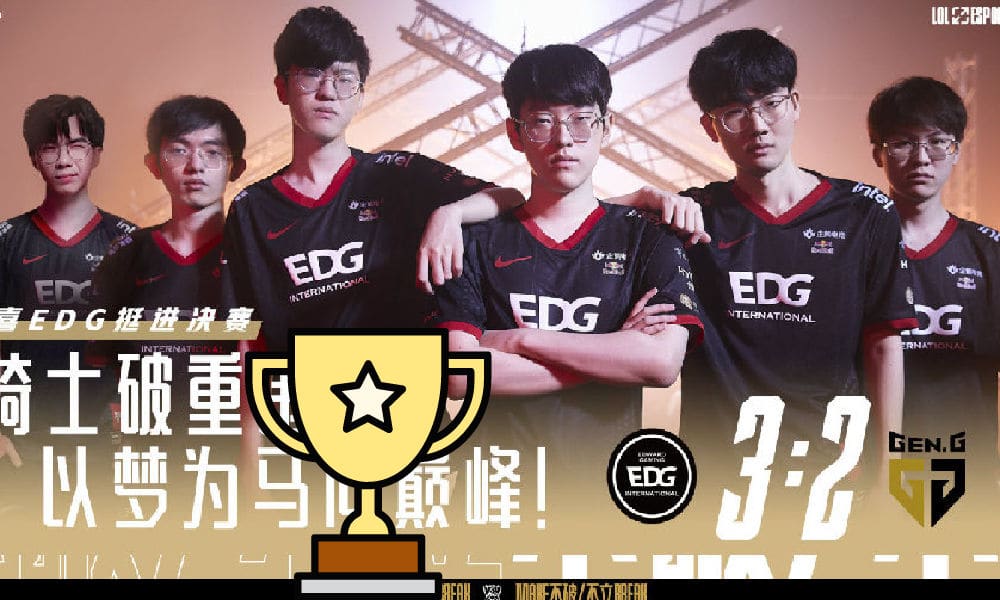
People all over China were overexcited to see China’s Edward Gaming (EDG) team win the League of Legends World Championship (Worlds 2021) title in November of 2021. With the hashtag “EDG Wins Championship” (#EDG夺冠#) getting over 3,7 billion views on Weibo, many netizens saw the success of the Chinese e-sports team as one of the highlights of the year.
After the victory of Invictus Gaming in 2018, EDG is the second Chinese team to win the world championship tournament of League of Legends (LoL, 英雄联盟), an online multiplayer video game in which two teams strategically compete by gaining more strength through the accumulation of items and experience over the course of the game to destroy the other team’s base. EDG managed to beat their notoriously strong South-Korean opponents in the exciting finale.
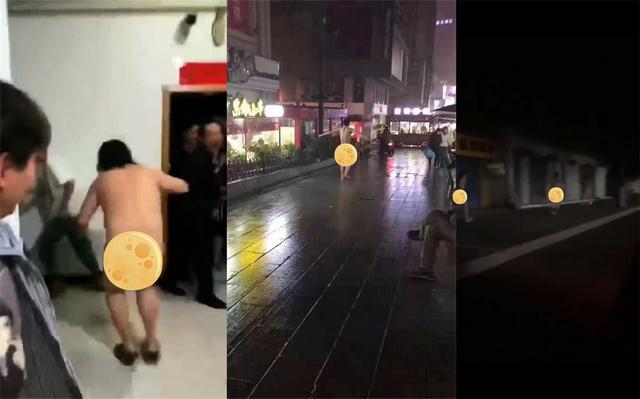
Chinese students who had promised to run around naked if the EDG team would win did so on the night of November 7.
Videos showing Chinese college dorms going crazy over the championship circulated all over social media. Some students in Xianyang got so carried away by the team’s miraculous win that they went as far as replacing the national flag in front of their college with the EDG team flag. Others also went a bit too far in celebrating their win; since they promised their friends that they would do things such as run around the school naked or have a sip of toilet water if China would win the World Championship, the most bizarre scenes unfolded across Chinese campuses.
F is for Floods in 2021

Various regions across China saw torrential rainfall and devastating flooding in 2021. Some of the most disastrous floods took place in Henan province in July, where Zhengzhou city and surrounding towns and villages faced the strongest rainfall ever recorded.
Amid the floods, some terrible scenes went trending on Chinese social media, such as the critical situation that unfolded in Zhengzhou Metro Line 5, where some 500 passengers got trapped inside trains with water reaching up to their necks. Rescuers arrived at the scene to help people escape, but 14 people did not make it out alive.
In Henan alone, the floods left more than 300 dead. Besides Henan, Hubei province, Sichuan, Shanxi, Hebei, and other areas were also struck by heavy rains and flooding. In Shanxi, more than 1.76 million people were affected by severe flooding.
For more about the role social media played in times of China’s flood disaster, read our article here in English or in German.
G is for Gansu Marathon

What was supposed to be an exciting ultramarathon race turned into a terrible tragedy in May of 2021 in Gansu’s Baiyin, where 21 runners died on a mountainous high-altitude track under extreme weather conditions.
The May 22 long-distance race started in the morning with 172 participating runners. Although all the runners had to have recent experience in running such a long race, they were not prepared when they encountered hail, freezing rain and strong winds during the afternoon. Many runners were just dressed in shorts and t-shirts, and the insulation blankets that they carried were insufficient to protect them from the sudden drop of temperature in the mountains. Although 700 people were involved in a rescue operation, 21 people did not make it out alive.

Runners who were freezing on the mountain shared photos on social media as the disaster played out in real-time on that terrible day.
The Gansu Marathon was a major topic on Chinese social media in 2021, not just because of the tragedy itself but also because people wanted to know who was to blame: was it a man-made disaster, or a natural catastrophe?
As a bright spot in this terrible story, there were the local shepherds who rescued many runners on the mountain by carrying them inside their huts and offering them shelter and warmth. At the end of the year, Chinese media and netizens are still reflecting on the stories of those villagers who saved the lives of many runners that day.
H is for Hongxing Erke

Image via Ellemen.
Nobody could have expected that Chinese brand Hongxing Erke (鸿星尔克, a.k.a. Erke) would become one of the country’s most popular sportswear brands in 2021. After all, Erke was only known as a relatively low-profile brand that seemingly was not doing too well over the past few years, especially compared to the bigger international brands and domestic sportswear brands such as Lining or Anta.
This all changed in late July of 2021, when the domestic sportswear brand donated a staggering 50 million yuan ($7.7 million) for the Henan flood relief efforts. This attracted a lot of attention on Chinese social media since Erke was known as a relatively low-profile brand that seemingly was not making a lot of profit. After people found out that the company donated such a high amount of money to help the people in Henan despite its own losses, its online sales went through the roof; everyone wanted to support this generous ‘patriotic brand.’ While netizens rushed to the online shops selling Erke, the brand’s physical shops also ran out of products with so many people coming to buy their sportswear. One female sales assistant was moved to tears when the store suddenly filled up with so many customers.
The brand’s popularity only further grew when the company also donated one million yuan ($153,800) to help rebuild the Henan Museum after the floods. A picture posted by Henan Museum on its Weibo account showed that Erke put the donation in the name of “China’s netizens.”
Especially at a time when consumer nationalism and anti-American sentiments are growing – also negatively impacting the reputation of brands such as Nike – Erke has proved to be a big hit. The brand’s generosity, its nation-loving image, and the fact that it is “proudly made in China” have all helped build on its reputation and have made the sportswear ‘underdog’ the coolest brand of the year.
I is for Involution (内卷)
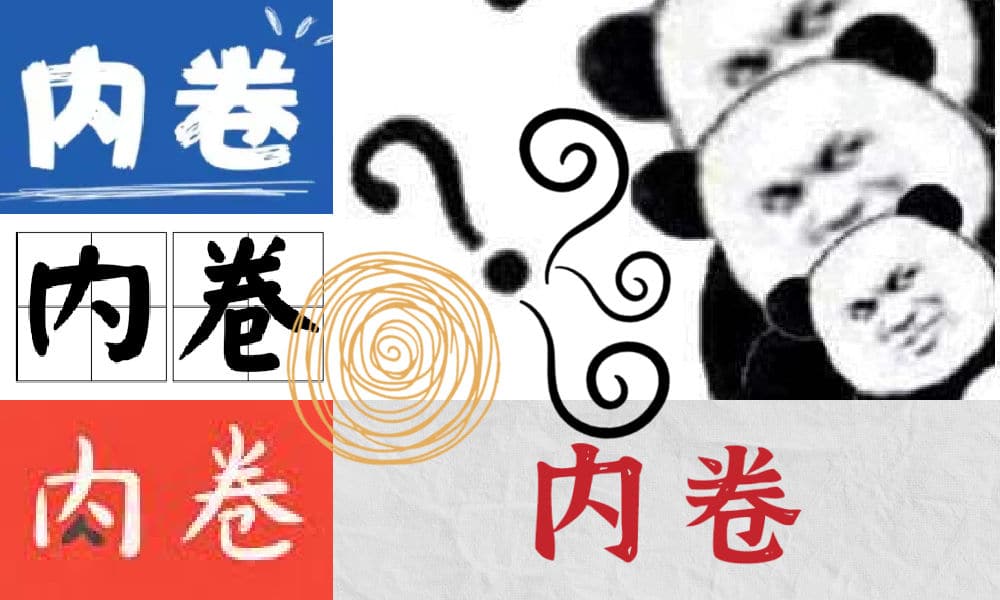
‘Involution’ (nèijuǎn 内卷) officially already was a top buzzword in Chinese media in 2020, but one scene from the Chinese TV drama A Love for Dilemma (小舍得) reignited online discussions on the concept again in 2021.
In the specific scene that went viral online, two male characters in the series discuss Chinese competitive society and its education system, saying it sometimes feels as if everyone is in a theatre watching a show together until one person stands up from their seat. This makes it necessary for other members of the audience to also stand up, until everybody is standing. The dialogue continues, with the two talking about how it does not stop at the people standing up. Because then there are those who will take it a step further and will stand on their seats to rise above the others. And then there are even those who will grab a ladder to stand higher than the rest. But they are still watching the same show and their situation has not changed at all – except for the fact that everybody is now more uncomfortable than they were before.
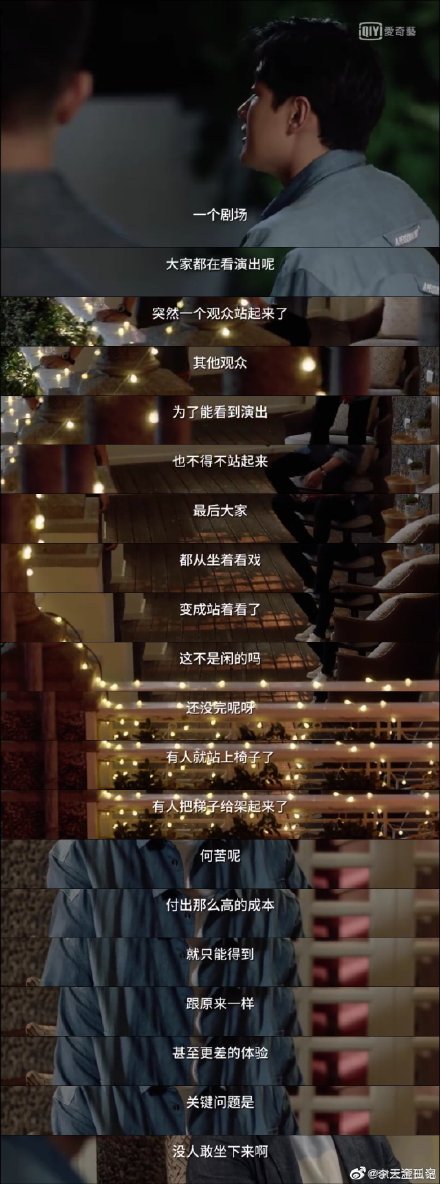
The dialogue from A Love for Dilemma in which the concept ‘Involution’ is explained.
The dialogue went viral for perfectly explaining ‘involution,’ the economic situation that occurs if, when the population grows, per capita wealth decreases. In China, this popular word has come to be used to represent the competitive circumstances in academic or professional settings where individuals are compelled to overwork because of the standard raised by their peers who appear to be even more hardworking, making life more difficult for everyone.

One viral image that captures the situation at hand is that of a Chinese college student who is working on his laptop while he is on the bicycle. In times of involution, there is always one person more competitive than the other!
J is for Justice for the People
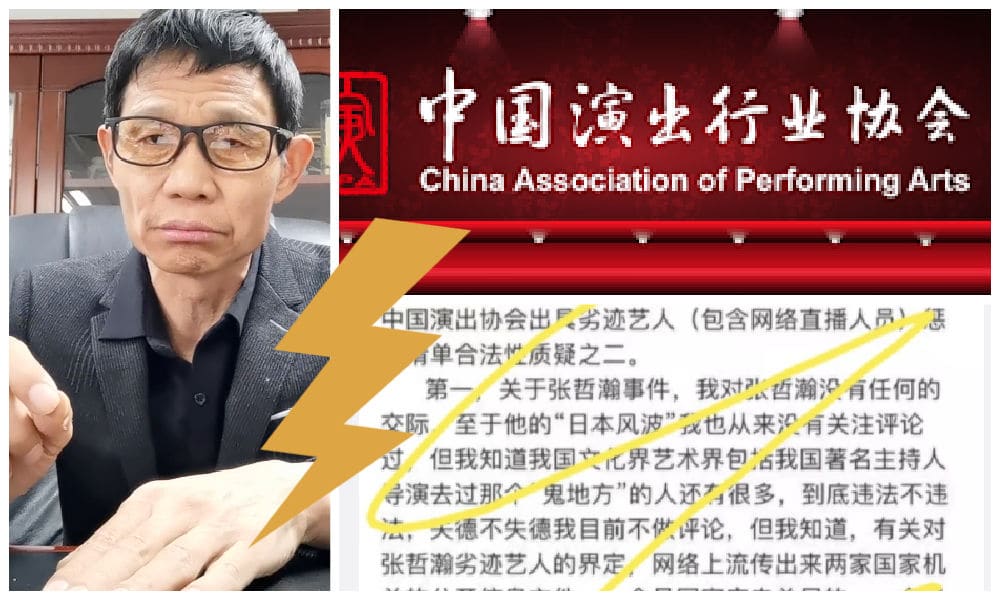
Famous Chinese producer Li Xuezheng became a hot topic on Chinese social media in late 2021, when he publicly questioned the authority of China’s Association of Performing Arts (CAPA) in issuing a blacklist of online influencers and celebrities.
One of the names CAPA put on their so-called ‘warning list’ is that of Chinese actor Zhang Zhehan (张哲瀚), whose online photos from him visiting the area around the controversial Yasukuni Shrine in Japan in 2018 got him into trouble in the summer of 2021.
Li Xuezheng’s main stance is that, although he says he supports the general initiative of making blacklists, he wants to know how, why, and if CAPA has the legal authority to ban Chinese celebrities from the industry. Li stresses that China is a law-based society and that these kinds of punitive measures should have a legal basis. His mission is therefore hashtagged “Justice for the People” on Weibo (#人民的公义# “public justice for the people”), which has since received over 5 billion views. Li, who says he’ll support actor Zhang Zhehan in filing a lawsuit, is praised by many as a courageous man who is not afraid to question authorities.
K is for Kris Wu

The Chinese-Canadian superstar Kris Wu, better known as Wu Yifan (吴亦凡), dominated Chinese social media in the summer of 2021, with news of his detainment over rape allegations leading to an explosion of comments on Weibo.
The 19-year-old student Meizhu Du (都美竹) was the first to accuse Wu of predatory behavior online, with at least 24 more women also coming forward claiming the celebrity showed inappropriate behavior and luring young women into sexual relationships. Although Wu denied all allegations, more than a dozen firms either cut ties or terminated contracts with him. As the scandal unfolded, various hashtags related to the story received billions of views on Weibo. Wu was formally arrested on suspicion of rape in mid-August 2021.
Although the Kris Wu scandal was somewhat of a social media earthquake already, his detainment was just the beginning of a summer filled with celebrity scandals.
L is for Li Ziqi
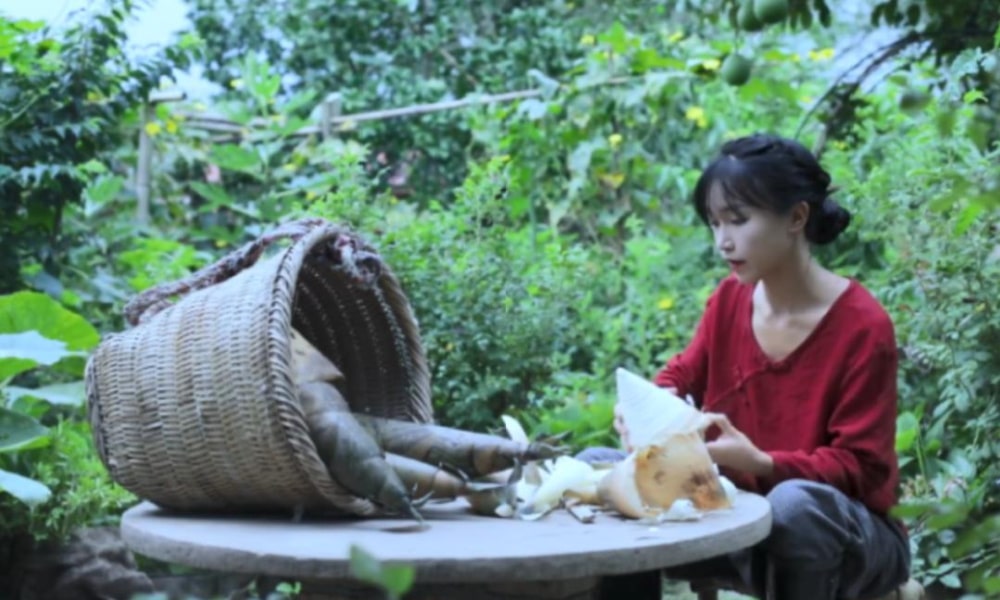
Li Ziqi, image via the Paper.
Li Ziqi (李子柒) is a Chinese internet celebrity who has been active as an online influencer and lifestyle vlogger since 2015, focusing on traditional Chinese foods, agriculture, tea, nature, and handicrafts. She has a Douyin channel with 55 million fans, a Youtube channel (16.5 million subscribers), and an e-commerce shop. Her videos are known for being very calm and soothing, showing Li preparing food in her hometown in Sichuan while birds are singing in the background, featuring beautiful scenes from nature and relaxing music.
Li was also called a “Chinese soft power ambassador” for having the most popular Chinese channel on YouTube, showing the beauty of China to the world. She was previously even named as one of the Top 10 Women of China and has become a cultural ambassador for Sichuan’s agriculture.
But Li’s regular content uploads were halted in the middle of 2021, when the social media star allegedly ended up in a legal battle with her company’s co-investors over shares and dividend payouts. Her Weibo has not been updated for months, neither has her Douyin or Youtube channel. The sudden video stop caused speculation and concern online – why was Li not posting anymore? Was she in trouble? Is she being silenced? Hopefully, 2022 will bring more answers and new Li videos about idyllic agricultural life.
M is for Meng Wanzhou

Nearly three years after the CFO of Huawei and daughter of Huawei founder Ren Zhengfei (任正非) was first detained in Canada during transit at Vancouver airport at the request of United States officials, Meng Wanzhou (孟晚舟) returned to China in 2021.
Meng Wangzhou was accused of fraud charges for violating US sanctions on Iran. Ever since late 2018, Chinese officials were demanding Meng’s release and called the arrest “a violation of a person’s human rights.” Meng was under house arrest in Vancouver while battling extradition to the United States.
Meng’s return home became a major topic on Chinese social media, where the Weibo hashtag “Meng Wanzhou About to Return to the Motherland” (#孟晚舟即将回到祖国#) received nearly three billion views, with thousands of netizens welcoming Meng back home.
While Meng returned to China, Canadian nationals Michael Kovrig and Michael Spavor, who were both arrested in Beijing in December of 2018 on suspicion of espionage, also returned home to Canada. While Meng’s return triggered thousands of posts and comments on Weibo, the release of Kovrig and Spavor did not get nearly as much attention.
N is for Nine-Nine-Six (996) Working Culture
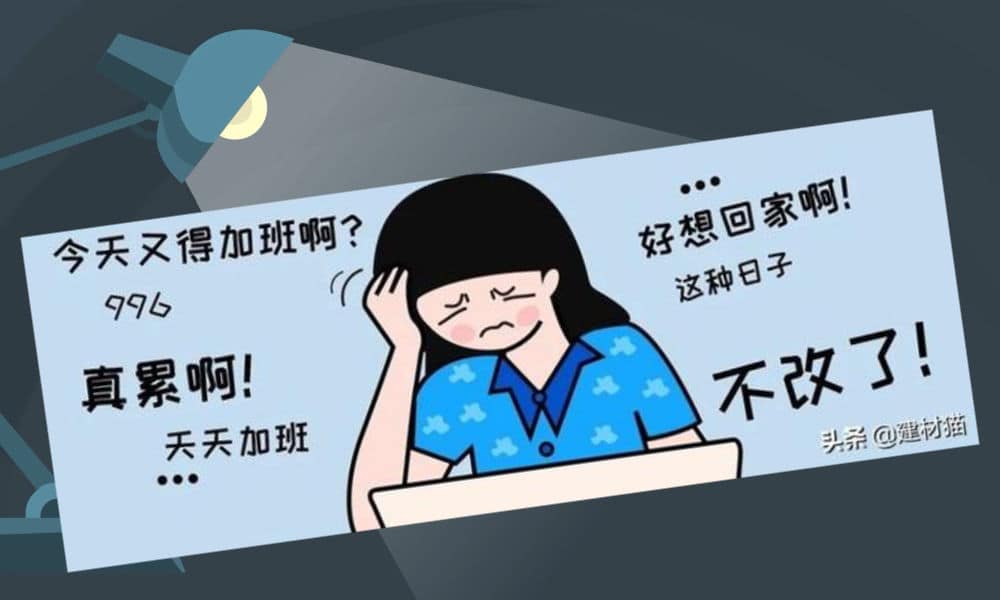
Working ‘996’ schedules, which means working from 9am to 9pm for six days per week, is a reality for many Chinese workers. In 2021, China’s strenuous 996 working culture became a major topic of discussion.
Earlier in 2021, tech giant Pinduoduo made headlines when two of its young employees passed away. The sudden death of a 22-year-old female employee was soon linked to the company’s overwork culture, and when a male employee committed suicide days later, more staff members started speaking out about Pinduoduo’s working culture, making 996 a hot topic.
In August of 2021, Chinese authorities issued a stern reminder to companies that 996 schedules are illegal, and tech companies such as Bytedance and Kuaishou also began to change their long working hours. Whether or not 2021 will go down in history as the year in which China’s 996 working culture ended, yet remains to be seen.
O is for the Olympics

The Olympics were a big topic on Chinese social media in 2021, not just because China’s hosting of the 2022 Winter Olympics is nearing, but also because of China’s success at the 2021 Tokyo Summer Olympics.
While online discussions especially became intense and often funny on Weibo when it came down to competitions between China and Japan, there were also Chinese female athletes who suffered cyberbullying because of their performances during the Olympics.
For the Beijing 2022 Winter Olympics, the term “closed-loop management” (闭环管理) was introduced this year to describe the ‘biosecure bubble’ that will be established for all participants of the Olympics. It basically means that participants will only be allowed to move between Games-related venues for their training, catering, accommodation, etc. They will do so through a dedicated Games transport system.
Although the Olympics were already a big topic in 2021, it will also definitely become one of the bigger topics for 2022.
P is for Peng Shuai
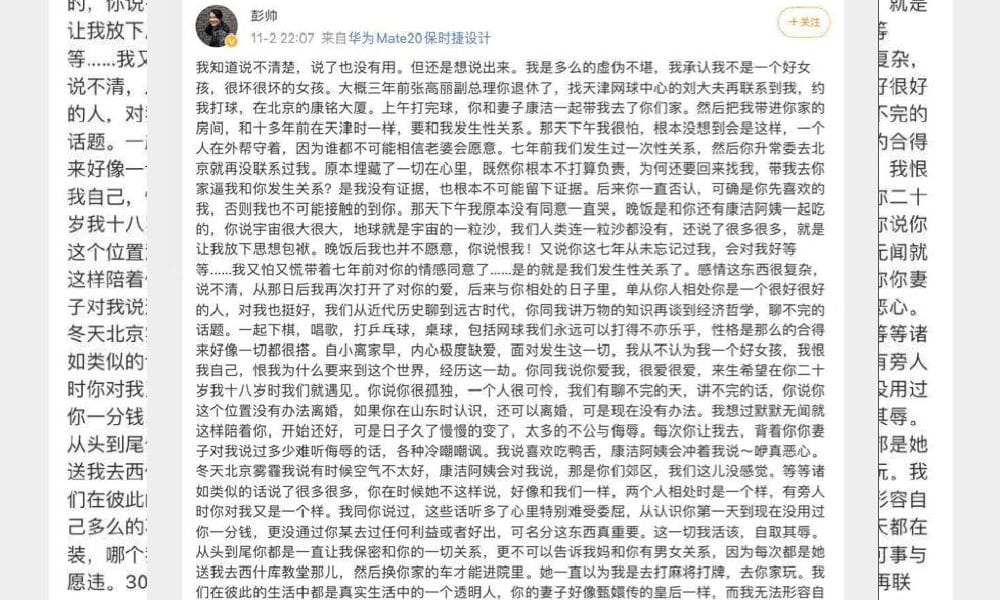
Peng Shuai (彭帅) is probably the biggest topic on Weibo that did not actually go trending this year, making her story a silent storm. In the night of November 2nd of 2021, a Weibo post by the 35-year-old Chinese tennis player sent shockwaves across social media.
In her lengthy post, the three-time Olympian describes details surrounding an alleged years-long affair she had with the married 75-year-old Zhang Gaoli (张高丽), who served as China’s senior Vice-Premier (2013-2018) and was also a member of China’s highest ruling council, the Politburo Standing Committee (2012-2017).
Although Peng’s post was only online for some thirty minutes before it was taken offline, screenshots already circulated on WeChat and beyond. When all discussions on the issue were censored, it triggered a wave of global concern about Peng’s wellbeing and whereabouts, which eventually also led to WTA announcing the suspension of all tournaments in China.
In December of 2021, Peng told a Lianhe Zaobao reporter at a Shanghai event that she has always been free and is not being monitored. Although Peng has appeared in public on multiple occasions, her name is still being censored on Chinese social media.
For a full translation of Peng’s post and a timeline of events, see our article here.
Q is for QR-based Society

Before the pandemic, QR codes were already used everywhere in China. QR codes are mainly used for mobile payments, but they are also often used for marketing purposes or to give people access to certain information or videos. Since the outbreak of Covid19, QR codes have become even more crucial in everyday life, since the Health QR Code System has become an important weapon in China’s fight against Covid19.
The first health code apps, developed by Alipay and WeChat, were launched in February 2020 to identify people’s risk of exposure to the virus and freedom of movement. The color-based code was soon assigned to some 900 million users in over 300 cities and became mandatory for those entering public spaces.
Health code apps work with three colors that are automatically generated based on the collected user’s data (including travel history, duration of time spent in risky areas, etc): green, yellow, and red. A green QR code allows an individual to travel within the city; a yellow one implies potential risks that require an at-home quarantine for 7-14 days; and a red code imposes a 14-day quarantine.
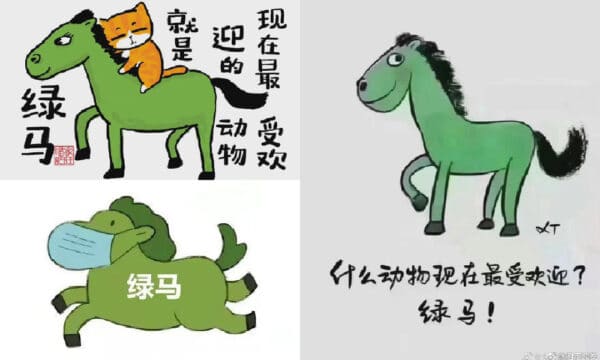
This year, “defending the green horse” (保住绿码) became a popular phrase on Chinese social media. The ‘green horse’ is a wordplay on ‘green QR code,’ which sounds the same (绿码). Since you can’t go anywhere if you’re not ‘riding’ that ‘green horse,’ netizens joke that defending the green horse is the most important task they have.
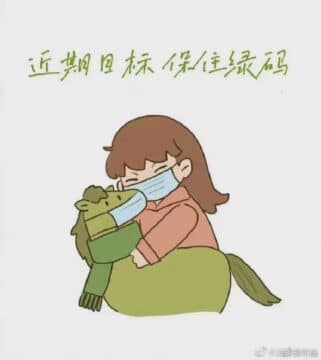
R is for Return Policy of Canada Goose

Canadian clothing brand Canada Goose caused major controversy on Chinese social media this year for its confusing and allegedly discriminatory return policy, which was found to be different in China than in other countries. Discussions on the issue flared up after the company reportedly refused to refund a customer in Shanghai for a damaged parka, stating that products sold at its retail stores in the mainland are non-refundable while Canada Goose allows a 30-day unconditional return outside of the mainland.
China’s Consumer Rights Protection Law stipulates that consumers should be allowed to return an item within seven days without giving a reason. Chinese netizens accused Canada Goose of double standards, not only for not even granting customers a seven-day period to return purchases, but also for making an exception to their worldwide 30-day return policy for mainland China.
The online anger over the Canadian fashion brand’s alleged discriminatory practices came in a year where foreign brands were already increasingly under fire due to international tensions and rising nationalism.
In response to the issue, Canada Goose changed its return policy in China and now promises free return and exchange services to mainland customers within 14 days after their purchase.
S is for Shanghai Red Mansion

The story of the ‘Shanghai Red Mansion’ caught the attention of thousands of netizens in late 2021, when a Chinese media outlet covered how dozens of women were forced into sex work inside a six-story building in the Yangpu district of Shanghai.
The Red Mansion has everything to do with Zhao Fuqiang (赵富强), a man who made headlines in September of 2020 when he appeared before a Shanghai court in relation to gang-related crimes. Zhao Fuqiang and 37 other defendants were found guilty of leading and participating in organized crime, rape, prostitution, fraud, bribery and corruption.
Zhao, who was given the death penalty in 2020, used threats and physical violence to get young, rural women to work for him. As an underworld kingpin, Zhao needed a safety net to protect him. At the so-called Little Red Mansion, Zhao would invite high-level governmental and businesspeople.
In December of 2021, China Business Journal (中国经营报) published an article detailing the the building and its layout, with many photos showing the extravagant rooms and peculiar layout design. Although the mansion has been closed since 2019, the shock was still big on social media, since the story did not come out until 2021.
The sentiment on social media was clear: if something big like this could happen in the busy center of Shanghai, with many officials being aware of it, what else is there that we don’t know?
For more on this story, check out our article here.
T is for Three-Child-Policy
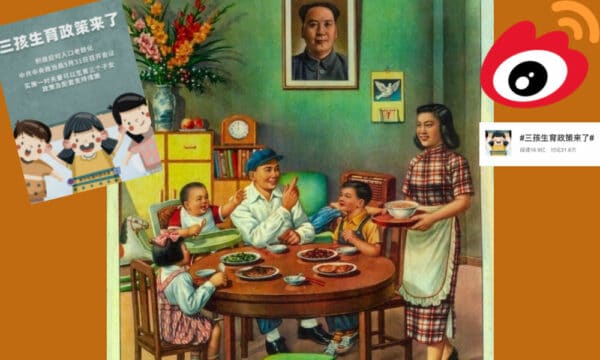
2021 was the year in which Chinese authorities announced that all Chinese couples would now be allowed to have three children, with the topic immediately going trending online.
The last time the government announced a major shift in family planning policies was in 2015 with the end to the one-child policy. Although many people applauded the change, which allowed couples to have a second child, there were also those who thought financial burdens would hold people back from having a second child.
With the 2021 shift to a ‘three-child policy,’ many people also mentioned the economic burden that having more than two children would have on couples. A Weibo poll by Chinese state media outlet Xinhua asking, “Are You Ready for the Three Child Policy?” was ridiculed by some when nearly 30,000 people replied “I am not considering it [three kids] at all”, with only a few hundred people indicating a more positive stance on the policy. The poll was soon deleted.
Despite all the criticism and online jokes, there were also those who were genuinely happy that having three children would now be allowed for all couples. Recurring comments praised the freedom that comes with the loosening of family planning policies: “If you want to have more children, you can. If you don’t want to, you don’t have to.”
U is for Uploader Death Shocks Bilibili

There were some incidents in 2021 that showed how bloggers and online influencers can struggle with depression or other issues, also impacting those who follow them and creating more awareness on these issues.
One big story in 2021 involved the death of a so-called ‘uploader’ (called ‘UP’), a content creator, on the platform Bilibili. The blogger named ‘Mo Cha’ suffered from nasal tumors and other health problems. Although doctors advised that he needed to be hospitalized, he could not afford the treatment and surgery he needed. The impoverished young man also suffered from malnutrition, and often complained about his stomach hurting in online posts.
When it was verified that Mo Cha had died, social media saw an outpouring of expressions of sympathy and art dedicated to him.
Another big topic was that of a young Chinese woman who took her own life by drinking a bottle of pesticide during a live stream.
V is for Viya

Viya is one of China’s most well-known and successful live streamers. In October of 2021, the ‘e-commerce queen’ made headlines when she managed to sell 20 billion yuan ($3.1 billion) in merchandise in just one live streaming session together with e-commerce superstar Lipstick King for a promotional event for Single’s Day.
In December of 2021, however, the successful online influencer made headlines for an entirely different reason, as it became known that she had been ordered to pay over 1.3 billion yuan ($210 million) in taxes, late payment fees, and other fines according to the Hangzhou Tax Administration Office.
Soon after this news came out, Viya’s livestreaming channels was suspended, and her social accounts on Weibo and video-sharing platform Douyin were also shut down.
W is for Wandering Elephants

A herd of wild Asian elephants that wandered hundreds of miles across southern China became a top trending topic on Chinese social media this year.
With much interest, netizens followed the journey of a herd of 16 elephants from their home in a wildlife reserve in mountainous southwest Yunnan province to the outskirts of the provincial capital of Kunming. Through drones that monitored and photographed the elephants, people enjoyed sharing the sometimes-heartwarming pictures of the wandering animals.
In September 2021, the elephants returned home after covering a total distance of 1,300 km.
X is for Xinjiang Cotton Ban
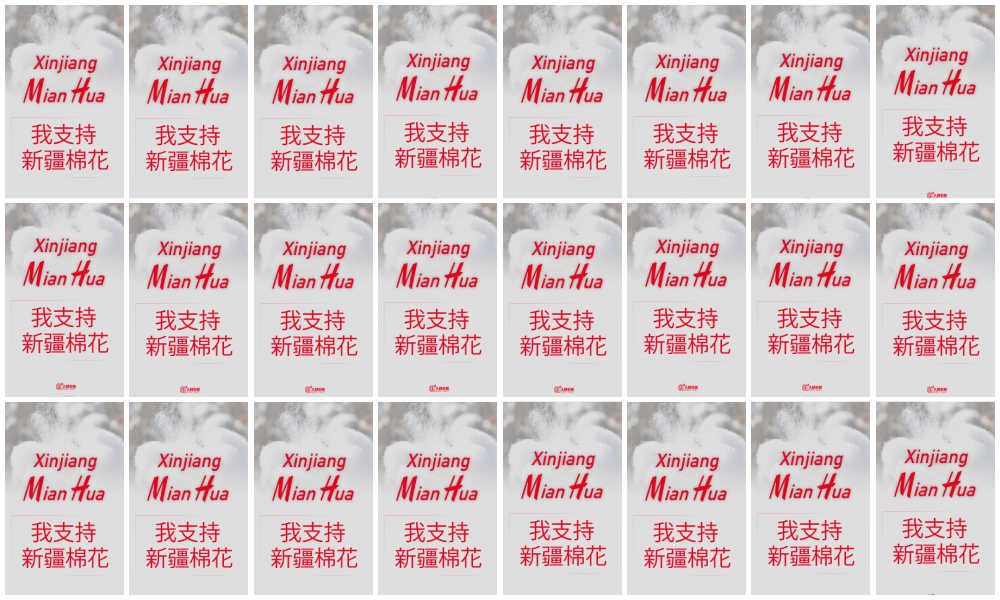
In March of 2021, the hashtag “I Support Xinjiang Cotton!” received over 6 billion views on Weibo after news came out that foreign brands including H&M, Nike and Adidas would no longer source cotton from Xinjiang over allegations of forced labor in the region. The move was part of a decision by the international NGO Better Cotton Initiative (BCI), which already announced it would cease all field-level activities in Xinjiang in late 2020.
The news was followed by a wave of social media boycott movements in China, with Chinese brand ambassadors cutting ties with international brands involved. Chinese e-commerce platforms Taobao, JD.com, Pinduoduo, Suning.com, and Meituan’s Dianping responded by removing H&M from their platforms.
Thousands of Chinese netizens supported Xinjiang cotton and those brands who still sourced their cotton from the region, with ‘patriotic’ brands on Taobao purposely starting to advertise their products as using “100% Xinjiang Cotton.”
Y is for Yuan Longping
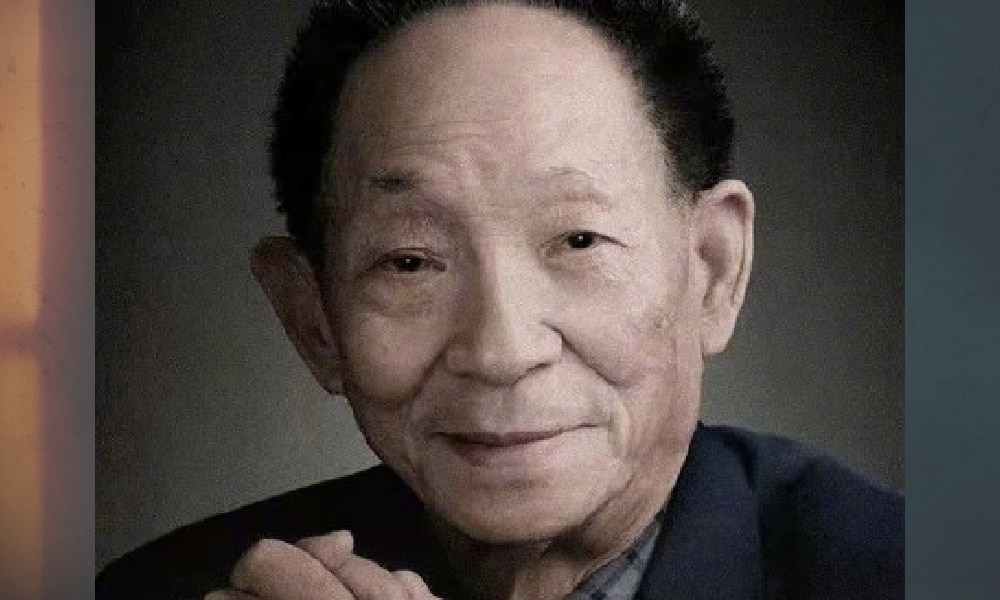
Yuan Longping (袁隆平), also called the “Father of Hybrid Rice,” was a Chinese crop scientist who is famous for developing the first hybrid rice varieties in the 1970s. As someone who experienced the horrors of famine himself, Yuan’s development of high-yield rice hybrids made him a national hero in China, and he was credited with saving countless lives.
Yuan (1930) passed away on May 22 of 2021, and he was mourned by thousands of netizens online. As a key player in the Green Revolution, Yuan is honored as of China’s most famous and important scientists.

I Always Had Two Dreams” “我一直有两个梦想” by digital artist Wuheqilin.
Chinese netizens posted many images and art pieces honoring Yuan. The artist Wuheqilin, most famous for political satire mocking Western powers, also made a patriotic artwork dedicated to Yuan.
Z is for Zheng Shuang Surrogacy Controversy
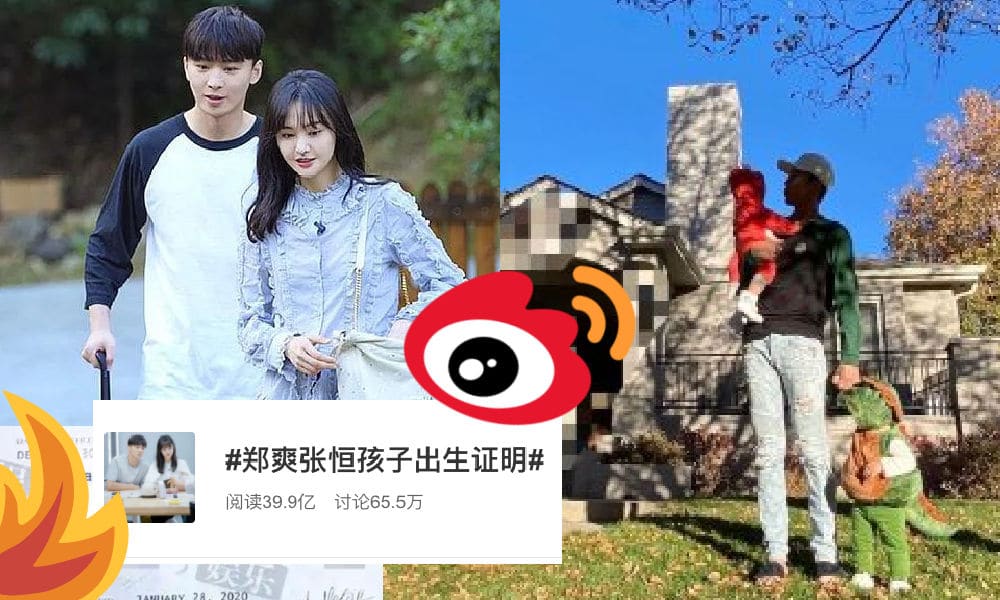
In a year that was filled with celebrity controversies, one of the biggest was that of Chinese award-winning actress Zheng Shuang (郑爽) who got caught up in major controversy together with her ex-partner Zhang Heng (张恒) when a social media storm erupted in January of 2021. That is when rumors surfaced on Weibo and Wechat that the celebrity couple had separated and that there was a dispute involving two of their children born in the US through a surrogacy arrangement. The topic soon became known as the Zheng Shuang ‘Surrogacy Gate’ (郑爽代孕门).
Similar to other celebrity breakups that occurred in China recently, a lot of the developments in the divorce played out on social media – Zheng’s ex-partner posted about the situation on Weibo and it became clear that Zheng Shuang allegedly left him stranded in the United States with the two babies, unable to bring them back to China with him since she supposedly did not cooperate with the necessary legal procedures.
The scandal was just the beginning of Zheng’s unfortunate 2021 year. In light of the controversy, various brands ended their partnership contracts with the actress, and Zheng’s professional career suffered a major blow when Huading Awards announced it would revoke Zheng’s honorary titles, including former awards for best actress and favorite TV star. The celebrity was also boycotted by China’s State Administration of Radio, Film, and Television, and she was later ordered to pay a $46 million fine for tax fraud, before ending up on the blacklist of China’s Association of Performing Arts.
To read more about canceled celebrities check out our article here.
By Manya Koetse
Follow @whatsonweibo
Featured image by Ama for Yi Magazin.
This text was written for Goethe-Institut China under a CC-BY-NC-ND-4.0-DE license (Creative Commons) as part of a monthly column in collaboration with What’s On Weibo.
Spotted a mistake or want to add something? Please let us know in comments below or email us. First-time commenters, please be patient – we will have to manually approve your comment before it appears.
Manya is the founder and editor-in-chief of What's on Weibo, offering independent analysis of social trends, online media, and digital culture in China for over a decade. Subscribe to gain access to content, including the Weibo Watch newsletter, which provides deeper insights into the China trends that matter. More about Manya at manyakoetse.com or follow on X.

China Animals
Behind the Mysterious Death of Chinese Internet Celebrity Cat Wukong
“Dont believe the media,” Zhao Shuo said: “And also don’t believe me.”
Published
3 months agoon
May 11, 2025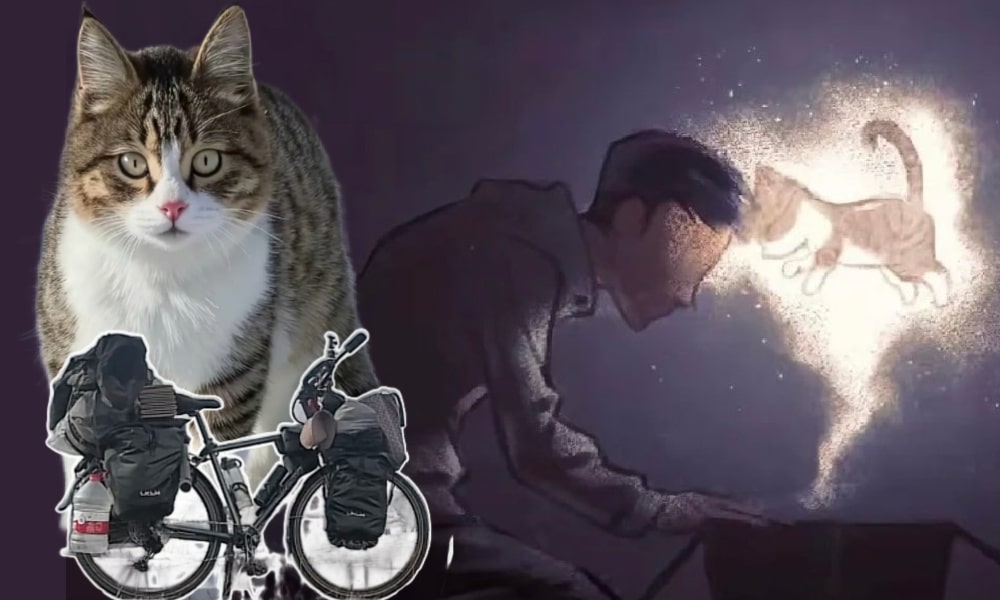
How did the death of a young stray cat lead to a online wave of grief and outrage over the past few days? It started with fans mourning a beloved Chinese internet celebrity cat, then turned into backlash against fake news, anger over animal cruelty groups, and suspicions that local officials were more concerned with controlling the narrative than finding the truth.
Although things turned dark quickly, it began beautifully light.
The journey of Chinese cyclist Zhao Shuo and his cat Wukong seemed to come straight out of a novel. Zhao Shuo, the protagonist: a solitary traveler who would cycle through snow-covered mountains and endless desert roads for days on end, seriously disciplined and focused.
Then came Wukong, the playful and spirited stray cat who suddenly appeared, curled up inside his tent, purring happily beside him as if they had always been together. She found just the warmth she needed – and so did he.
From Stray Cat to Star Status: Wukong and Zhao’s Journey
Zhao Shuo (赵朔) is a Chinese cyclist who runs a social media account about his adventurous travels, cycling and camping in China’s western regions. Since 2023 – starting in Xi’an — he has been documenting his remarkable journey on his Douyin account “Notes from Zhao Shuo’s Western Journey” (@赵朔西行漫记), which now has over three million followers.
In his videos — often long-form by Douyin standards (ranging from 12 to 40 minutes) — he offers viewers a glimpse into his ‘bikepacking’ life, cycling across West China, including Tibet, Xinjiang, and Qinghai, where he sometimes goes days without seeing another person, coming across lush green areas and dry, sandy territories while dealing with extreme temperatures.

Zhao Shu’s adventurous bicycle and wild camping travels, documented on Douyin. Screenshots via whatsonweibo.com.
Zhao had already published dozens of videos of his bicycle tour when he first introduced the kitten he named ‘Wukong’ (悟空) to his followers.
On October 30, 2024, while camping out in a village in Kanas (喀纳斯), near the main peak of the Altai Mountains (阿勒泰) in northern Xinjiang, the stray appeared in front of his tent at 4 am, waking him up with her cries. The kitten seemed cold and hungry. She had a small injury near her mouth and might have been a target in an area filled with stray dogs.
When he allowed her to step inside his tent, she soon comfortably settled inside his sleeping bag and purred away (video). In the morning, she stuck around the tent, Zhao fed her, and the two bonded.

Wukong on the night she ‘adopted’ her human master.
Of course, Zhao was smitten – and so were his followers – how could he possibly leave his ‘Wukong’ behind now? A suitable and creative nickname, ‘Wukong’ is the legendary Monkey King in the classic Chinese novel Journey to the West (西游记). Like the monkey’s 72 transformations, he hoped the cat would have 72 lives instead of just nine, and decided to take her along with him.
Wukong made Zhao’s travels a lot more lively, but also a bit trickier — he had to rearrange his cycling gear to accommodate her, including a special cat backpack and a basket out front, and now he was cooking for two.

A new travel companion.
But it was all worth it. Wukong, who Zhao endearingly called his “stinky cat” (臭喵), grew bigger, chubbier, and braver, and the two became inseparable. By late December, it was minus 20 degrees Celsius (−4°F) when the two visited the scenic Sayram Lake (赛里木湖), where they played in the snow — something they would do far more often later on in their journey.

Playing in the snow – a favorite pastime of Zhao and Wukong.

Snow adventures at the lake, by @奶盖味的小山竹.
So far, so cute – the story of the lonely traveler Zhao finding an unexpected companion in the little stray Wukong resembles that of the Scottish Dean Nicholson, who found a best friend in Nala while cycling through Bosnia and then taking her along cycling around the world. It even led to the book Nala’s World.

The story of Zhao and Nala shows some resemblance to that of Dean Nicholson and his cat Nala, about which he wrote the book Nala’s World. (Image via Traveling Cats).
Zhao kept Wukong close, but still gave her enough freedom to roam around. In the late afternoons or at night, she would play around the tent — or in the guesthouse room when temperatures dropped too low. She often hunted for mice and would proudly bring Zhao her catch. She always returned to him. In December, as they passed through areas with more cars and traffic, Zhao got Wukong a cat leash and a GPS collar for safety.
Chinese netizens and media quickly took notice as the special bond between the cyclist and his cat deepened — the two literally sticking together through snow and wind, sunshine and rain. In December 2024, they even made the news for unexpectedly boosting sales of a Xinjiang yogurt brand featured in many of Zhao Shuo and Wukong’s videos. Zhao’s travels, with Wukong the internet celebrity cat as his ‘mascot,’ seemed to bring positive attention to Xinjiang and its various regions.
“It’s Done”: Wukong Is Gone
The happy story of Zhao and Wukong abruptly ended on April 15. In a video posted to Douyin in the middle of the night, Zhao Shuo, his eyes glassy and his appearance stressed, explained that Wukong had a run-in with a car earlier that day and was now “eternally resting.”
Standing on the side of the road in Ruoqiang (若羌), with Wukong’s remains in a cardboard box, Zhao said he had just gotten a car from the Miran Site (米兰遗址) to try and find a freezer to store the remains of his cat friend, hoping some of his followers could help. The video received more than 116,000 replies.

The midnight call for help from Zhao in Ruoqiang.
However sad, Wukong’s death initially did not attract as much attention outside the Zhao and Wukong online fan circles. The case really began receiving widespread attention in the weeks that followed, as what first appeared to be a tragic accident started raising unsettling questions.
In early May, Zhao Shuo posted a 42-minute video (link to copy) recounting the various developments — from how Wukong died to everything that followed.
On April 15, Zhao Shuo and Wukong woke up at their campsite near the visitor center of the Miran Ruins (米兰遗址) — the remains of an ancient Silk Road settlement and Buddhist religious center located in Ruoqiang County.
Zhao had slept in that day until 3pm due to a rough, sleepless night the previous night. Zhao got out of his tent to go to the public toilet nearby, chatted with some visitors, and Wukong was following him as usual, staying near and playing around the square in front of the visitor center. Zhao put the GPS collar on her around 4 pm.
After 4 pm, Zhao briefly went into the main hall and took some photos. Wukong did not go in with him and remained at the front of the hall. Inside, Zhao inquired about the best route to continue his travels from Ruoqiang in Xinjiang toward Qinghai. He exited around 4:20 and visited the museum on the premises. It wasn’t until later in the afternoon, when he returned to his campsite, that he found Wukong was no longer there — not at their spot, not at the site.
By 6 pm, he went out looking for her. Thanks to the GPS system, he found — to his surprise — that Wukong’s location was over two kilometers away, and that there had been some disturbance in the signal.
He kept the camera rolling as he headed out on his bike to look for her, calling her name through an area of desert and empty highway. Then came the tragic moment Zhao spotted Wukong lying by the side of the road: “Oh god. I can’t believe my eyes, Wukong!” he said, the shock and pain visible on his face. The little cat was already lifeless and stiff. (Original video on Douyin removed; reuploaded video on YouTube: this is the moment Zhao finds Wukong)

Their heartbreaking final ride together.
“The stinky cat has been running around,” Zhao said, his voice breaking. “It’s done.” In a moving scene, he placed her in the basket on the front of his bike to take their final ride together and bring her back to the camp.
“Inexplicable Death, Full of Suspicious Points”: Zhao Searches for Answers
Back at the camp, Zhao walked around with Wukong’s stiff body in his arms, placing her on the ground and then picking her up again, seemingly overwhelmed with grief and unsure of what to do next.
Perhaps speaking more to himself than his viewers, he wondered how this could have happened — there was nothing but desert out there, with only a patch of green near his campsite. Wukong always stayed close, and there was nothing beyond to explore. How had she ended up so far from the site, all the way out by the national highway?
Once he collected himself, Zhao’s first priority was to cool Wukong’s remains. He packed up his belongings, arranged for a car, and made his way to Ruoqiang. There, he arranged storage for his bike and posted that video asking his followers if anyone could lend him a freezer. After that was taken care of, he spent the following days organizing a vehicle and a portable icebox. With Wukong stored in the back of the car, he returned to Miran to check the security footage — only to find that nothing had seemingly been recorded due to a malfunction.
The complete lack of surveillance footage was not the only peculiar detail surrounding the death of Zhao’s cat. To his surprise, he came across a news article from the well-known Chinese media outlet Jiupai News (九派新闻), reporting on Wukong’s death. The article had been published just hours after Zhao posted his first video announcing her passing and within 24 hours of her death.
In the report, published on April 16 at 14:04, reporter Huang Qiaowen (黄巧文) wrote that Wukong had died in a car accident, citing police as saying that the cat had crawled under a car and was accidentally run over when the driver started it. The article claimed the matter had already been resolved.
But according to Zhao, he had no idea how his cat had actually died — and had never come to any “understanding” with a car owner. “Which car owner? I don’t know anything,” he said. “This is considered a relatively big media outlet, it’s truly a blatant fabrication.”
Zhao added that he had spoken directly with the police, who told him they had no details about the incident beyond what he himself had reported, making the news story entirely false.
Zhao Shuo decided to set out again in a rental car on April 19, driving nearly 900 kilometers (560 miles) from Ruoqiang, via Korla, to Urumqi — the capital of Xinjiang. There, he visited three different pet hospitals to have Wukong examined, including both an X-ray and a CT scan.

The scans showed that Wukong’s organs and bones were intact.
In late April, Zhao returned to the Miran Ruins site twice, first to check whether the surveillance system had been fixed (it hadn’t), and later to see if any footage from the day Wukong disappeared had been recovered. Although the system was eventually repaired, there was still no footage from that day. Zhao also searched the surrounding area for any other surveillance cameras but found none that were relevant to where Wukong came from and where she was found.
“Traveling with a cat is full of risks, and I could accept it if Wukong had died in an accident,” Zhao said. “But this inexplicable death is full of suspicious points.”
🚩 One of the suspicious points is that Zhao found no obvious external injuries on Wukong — no bleeding from the nose or mouth. However, while her paw pads were intact, her claws were completely worn down, with split and damaged nails. Zhao initially considered the possibility that Wukong had climbed under a car parked near the visitor center and was unknowingly taken along when it drove off, eventually falling out onto the highway — which could explain the worn claws. However, the examination results showed that all major internal organs and bones were intact, with no signs of trauma, ruling out both a vehicle collision and a fall from height. Suffocation was also ruled out by the veterinarians.
🚩 Zhao also noted that the button on her GPS leash had come undone when he found her — something the cat would not have been able to do by herself.
🚩 The night when Zhao went to Ruoqiang in search of a freezer to store Wukong’s remains, he packed her in a plastic bag inside a cardboard box. Although there had initially been no visible bleeding, when he removed her body around 2 am, he found blood flowing from her mouth and nose in a non-coagulating state. This type of bleeding is consistent with toxin-induced bleeding, not trauma or natural death.
🚩 The conclusions from the different veterinarians were all consistent with symptoms of poisoning. The CT scan showed undigested food in Wukong’s stomach — notable because Zhao hadn’t fed her yet that day, as they had both slept in until later that afternoon. Zhao also inquired whether there was any rat poison in or around the visitor center and was told there was none.
🚩 The manufacturer of the GPS collar provided Zhao with the recorded data: the last refresh was at 4:10 pm, when Wukong was still near the visitor center, just after he had put the collar on her. The next location recorded was at 4:30 pm, right at the spot where Zhao later found Wukong’s body. This leaves a 20-minute gap in the data, which is highly abnormal, as the signal should refresh every 2–3 minutes under normal conditions.
Beyond the strange 20-minute interval, this also means that Wukong would have had to travel the full 2 kilometers from the Miran visitor center to the remote highway junction where she was found within those 20 minutes. But by the time Zhao discovered her around 6 pm, her body was already stiff and covered in flies, suggesting she had died well before that, making the timeline even harder to explain.

GPS collar data shows a 20 minute gap and the collar location going from the visitor center to side of the highway.
🚩 The area where Wukong was found sees hardly any traffic — it’s a quiet, almost abandoned stretch of highway. With all the information at hand, it’s just one more detail that makes her death all the more incomprehensible.
With all the new developments and information at hand, Wukong’s death not only triggered a wave of grief among fans, it also sparked broader concerns and anger over how she died.
These concerns soon touched upon the topic of so-called “cat abuse groups” — online dark web communities of twisted minds who take pleasure in abusing animals. These groups reportedly film or even livestream the capture and killing of stray cats. Some individuals even pay to watch such content. There is also a disturbing phenomenon of “bounties,” where money is used as bait to incite others to abuse or kill cats — sometimes specifically targeting well-known or popular strays to generate more buzz and attention.
The existence of these cat abuse groups became more widely known in April 2023, when Chinese food vlogger Xu Zhihui (徐志辉) was exposed as a member of a cat abuse chat group on QQ.
Various Douyin users have claimed that Wukong was, in fact, listed on one of these so-called “bounty lists.”
Whether or not Wukong’s death was actually connected to such abuse groups remains speculative — although many bloggers believe it is — most netizens engaged in these online discussions are convinced that, group or not, Wukong was deliberately poisoned by someone with malicious intent.
At the time of writing, several online animal advocacy groups are still urging the public to come forward with any dashcam footage or information they may have about what happened on April 15.
“Don’t Believe Me”: An Unnatural Apology
Amid all the online anger and speculation, a 3-minute video update by Zhao Shuo appeared on his channel on May 9.
In the Douyin video (link to reuploaded copy on Youtube), Zhao explained how he had rented another car to get back from Qinghai’s Mangya (茫崖市) to return to Ruoqiang County a final time to further investigate the cause of Wukong’s death.
The video was recorded at the exact spot where he found Wukong.

From the apology video.
Looking ahead while walking, Zhao says:
💬 “These days, I’ve been at the local Public Security Department, the Publicity Department and Cultural & Tourism department. With the warm assistance of local volunteers and citizens, through a step-by-step analysis and investigation, and step-by-step restoration of the scene, we basically determined the cause of Wukong’s death. That is the death caused by accidentally ingesting a [certain] small rodent. Other types of causes like car accidents, poisoning and torture have all been completely ruled out. So if we put it this way, the person who carries the biggest responsibility for the death of Wukong is me. As his owner, I didn’t look after him good enough. Wukong’s death has absolutely nothing to do with anyone else. Furthermore, this incident has caused a very negative public opinion for the local area. I hereby apologize to everyone, even though I know this apology is powerless, because the direction of public opinion is not something that can be changed by individual will.”
That part of the video was picked up by Chinese media. Beijing Daily even posted the apology on Douyin.
But they did not include what came next: a moment when something seems to shift in Zhao’s demeanor.

“Don’t believe me,” Zhao says.
After walking with the wind at his back, he suddenly turns around, now moving against it, looks straight into the camera, and says:
💬 “Additionally, I want to remind everyone of two points. First, never blindly trust anyone or any media outlet, especially immoral ones like Jiupai News. You even should not believe me. Everyone should rely on their own judgment. You need your own independent thinking to assess what a matter is about, how it developed – make your own reasoned judgement. Second, no matter how difficult or shocking the changes in life may be, we must respond with rational judgment, not blind emotional outbursts. Emotional release won’t solve anything — it will only make matters worse. Only by handling things rationally can we truly resolve problems.”
Zhao concluded the video by bidding his viewers farewell — something that was just as unusual as the short format of his video.
The next day, the video was suddenly deleted, along with a few other ones. Zhao’s Douyin account was also set to private.
On Chinese social media, from Douyin to Weibo, most commenters think they know why. “It’s because his apology wasn’t considered sincere enough,” one Douyin user suggested. Others also suggest that Zhao had been ordered to create an apology video.
📱 “(..) [It] clearly sounded like someone higher up told him to say them — way too official/formal.”
📱 “Classic, truly classic — absolutely classic!!! (..) They only talk about the impact of public opinion, but not about what triggered it. And they even hide the truth! So classic!”
📱 “I’m bursting with rage, they’re deleting the Douyin videos. So they claim it’s because [Wukong] mistakenly ate a small rodent, and that’s why it unbuckled its own harness, the signal was blocked, and [the cat] walked two kilometers in a straight line by itself? Wow. I honestly don’t even know what to say anymore.”
📱 “Wukong would never eat a dead rat — at most, he’d eat small field mice. I’m really furious. I can’t say too much, I don’t want to cause trouble for [Zhao Suo], but I will remember this place: Ruoqiang County.”
📱 “It probably ate a bat, and after eating it, it could fly and flew straight for two kilometers… even managed to undo the clasp behind its neck… in the end, it clawed at the ground until its paws were torn apart, then collapsed and couldn’t get up...”
📱 “I think that if Wukong’s cause of death is really as the Ruoqiang authorities claim, then they should release pictures of this rodent species. This rodent is definitely poisonous — the evidence being that Zhao Shuo took Wukong to more than two hospitals, and tests confirmed the presence of toxins. After all, that area is visited by many tourists, so it’s important to inform them to stay away from this rodent.”
📱 “Doesn’t anyone want to know the truth? Doesn’t anyone feel very bad for these two? One died in an unclear and unjust way.The other suffered while seeking the truth, and was crushed by an invisible force, like a mountain pressing down. This is truly criminalizing the innocent. Most netizens only see what’s presented on the surface, and blindly believe it.(..) Hope this incident can push for improvements in the Animal Protection Law.”
Was Wukong truly the victim of an animal abuse group? Was the cat purposely killed by a local? Or, as some suggest, did she eat rat poison near the visitor center and was disposed of near the highway by people who did not want any trouble? Or is there a far more innocuous reason for the cat’s death, like digesting a poisonous rodent and running 2km before dying?
Regardless, the entire incident does little to enhance the image of Xinjiang’s Ruoqiang region, and this very likely played a role in the eventual ‘apology’ video posted — and then deleted — by Zhao.
There are many sides to this story, and you can dive deeper depending on what you choose to highlight. There’s the simple fact that Chinese digital media outlets like Jiupai News apparently fabricate stories for reasons one can only guess; there’s the angle that draws attention to how animal abuse is used as a form of entertainment in niche online circles; and there’s the undeniable reality that Chinese influencers have the power to make and break the public image of certain places in China — a fact that is readily embraced by local authorities when it casts them in a positive light, and sometimes quietly erased when it doesn’t.
But, above all, this is still a story about the friendship between a man and his cat. The way it ended only underscores just how deep that bond truly was.
After visiting Urumqi to have Wukong examined, Zhao drove another 600 kilometers (about 370 miles) — making it a total of 1,500 kilometers (around 930 miles) from Ruoqiang (and another 1,500 kilometers to return to his bicycle) — to reach Kanas and the majestic Altai Mountains, where he first met the kitten Wukong in 2024.

Wukong buried in the snowy mountains she loved – and where they first met.
It is here where Zhao wanted to say a final goodbye to his “stinky cat.” He dug a grave and laid Wukong to rest.
Meanwhile, on Chinese social media platforms like Weibo, Xiaohongshu, and Douyin, people are honoring Wukong — and venting their anger — in their own ways. These are some of the online tributes:

Wukong the cat, with reference to “Journey to the West,” saying: “Humans, do your best.” Posted by Douyin user: 大哥性感

Posted by Weibo user @杨于钥杨羊.

Zhao kneeling besides the box, with Wukong rising from it, shared by @余煌化妆师.

Dark hands reaching for the celebrity cat – original creator unknown.

The “Monkey King” cat is drying the tears of Zhao, at the camp site. Shared by @温婉的牛马, @赤火飞.

Wukong left at Altai Mountain, Zhao Su walks away. AI image via Xiaohongshu, original creator unknown.

Wukong in the grave, shared by @余煌化妆师.

Paw prints left on Zhao’s heart, memories of happy snow days.

More examples of online tributes to Wukong.
There are also artists who draw Wukong, sometimes on paper (see here), but also on walls (see videos here and here).
In a way, these images have now become a form of resistance in the face of uncertainty, and Wukong has come to represent something bigger.
One Weibo user wrote:
📱 “I’ve been continuously following this case. Based on the latest updates from the ‘master’ [an online nickname for Zhao Shuo], it really feels like he’s been threatened and can no longer continue searching for clues. In the end, it’s the power of capital and background connections that’s suppressing us ordinary people.(..) Supporting the legislation of an Animal Protection Law is more urgent than ever — it starts with you and me. Speak up for Wukong, and for the countless stray animals out there!”
Although there are various laws in China regarding wildlife and the protection of animals, there currently is no national law that is explicitly against animal cruelty for all animals. In recent years, voices calling for better laws on animal abuse in China have grown louder.
As for Zhao Shuo, he is continuing his journey — leaving Xinjiang for Qinghai. In his latest video, he said he won’t talk about Wukong anymore. Beyond any external pressures he faces, it will take time for him to process the loss of his travel companion, whose legacy endures not only in his heart but also within a much wider online community.
“Thank you for bringing joy into my otherwise ordinary days,” one Weibo user wrote. “Goodnight, little Wukong, and don’t forget — we’ll miss you very much, you stinky cat. I think I’ll remember this story for a long time — we’ll often look back at the footprints you left behind.”🐾🔚
By Manya Koetse
(follow on X, LinkedIn, or Instagram)
Spotted a mistake or want to add something? Please let us know in comments below or email us. First-time commenters, please be patient – we will have to manually approve your comment before it appears.
©2025 Whatsonweibo. All rights reserved. Do not reproduce our content without permission – you can contact us at info@whatsonweibo.com.
China Animals
Outrage over Chinese Food Blogger Torturing Cat in Online Video
Chinese food vlogger Xu Zhihui (徐志辉) was part of a cat abuse chat group on QQ.
Published
2 years agoon
April 28, 2023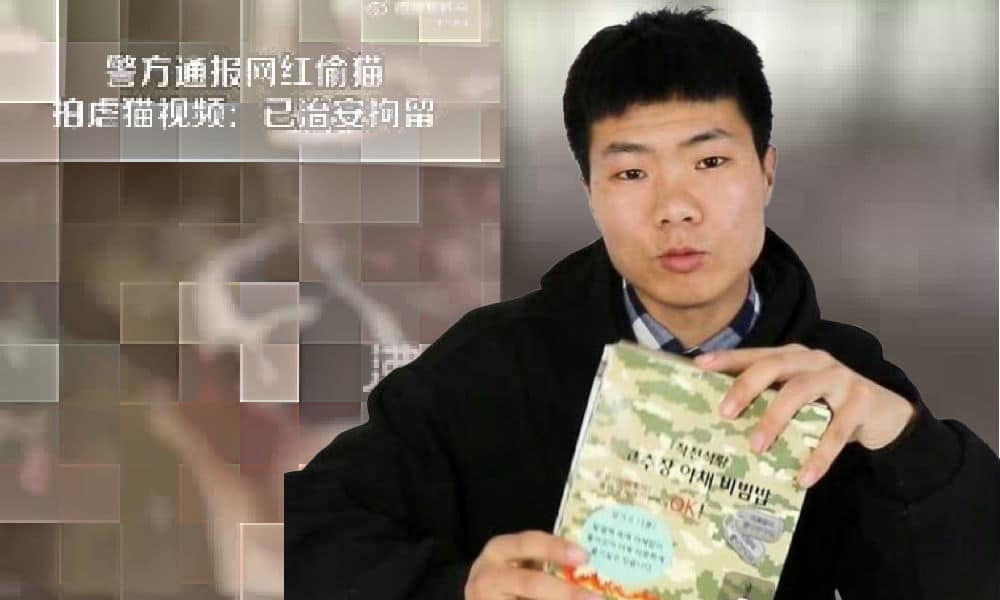
A shocking and extremely cruel video in which a Chinese wanghong (online influencer) tortures a stolen cat has sparked outrage on Chinese social media.
The person involved is the Anhui-based food blogger/vlogger Xu Zhihui (徐志辉), who runs multiple accounts, including a Bilibili account with more than 400,000 followers and a Weibo account with over 20,000 fans (@杰克辣条). Xu is mostly known for posting videos of himself cooking and eating food.
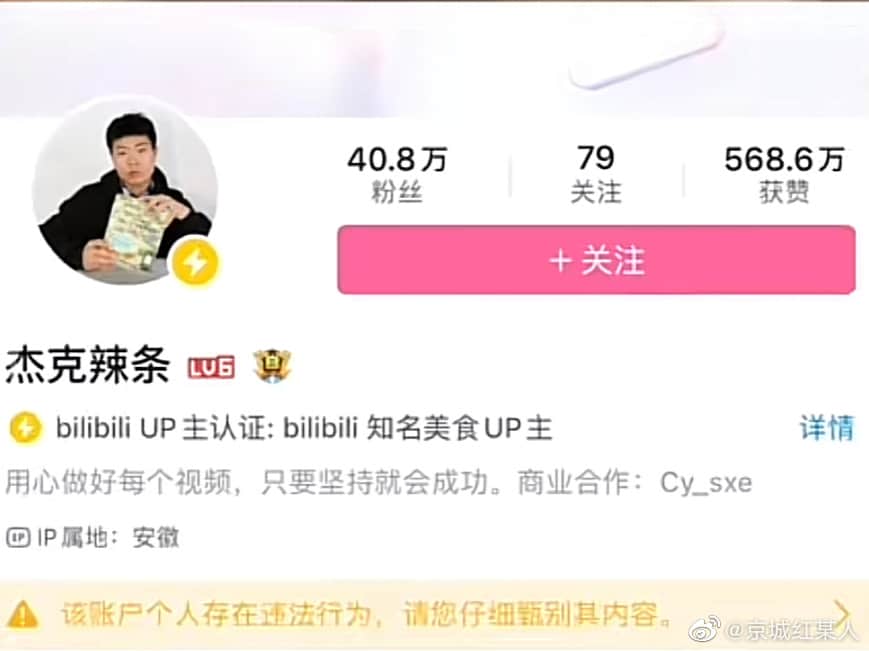
The cat abuse incident happened on April 15 in Funan County’s Lucheng, Anhui Province, where the 29-year-old Xu filmed his horrific acts, including tying up the cat, binding it to a tree, cutting its paws, and burning it alive. He then uploaded the video and shared it to a QQ group dedicated to cat abuse. It later circulated around social media, triggering outrage.

According to screenshots that leaked online and the very fact Xu was part of a cruel ‘cat abuse chat group,’ this probably was not the first time for him to torture animals.
According to a police statement, authorities received reports about the stolen cat and the abuse video on April 26th, after which they immediately launched an investigation.
On April 27th, Xu posted an apology on his Weibo channel, in which he said he felt ashamed and sorry for what he did and that he was willing to bear “all the consequences” of his actions. He also wrote that he was being criticized and held accountable by both the public security bureau and Internet authorities. “Please give me another chance,” he wrote. The comments on the post were switched off.
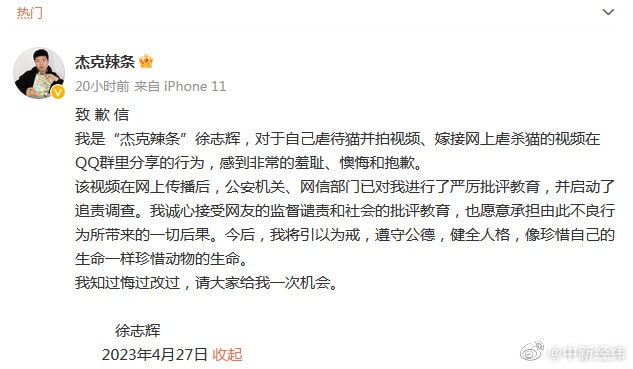
A noteworthy part of Xu’s online apology is that it has a dedicated Weibo hashtag page including a ‘topic summary’ in which Xu apologized. The hashtag page was hosted by Toutiao News. The mix of the personal message by Xu on a hashtag page hosted by Chinese media seems to indicate that these parties worked together in spreading Xu’s words about how remorseful he allegedly is (#偷猫拍虐猫视频网红道歉#).
The comment sections suggest that most people will not forgive Xu for what he did. Many people say the story makes them feel sick to their stomach, and that the idea of ‘cat abuse’ chat groups makes their skin crawl.
“People like this do not change,” one person wrote. “Give you another chance?! Did you give that kitty a chance?!”
“Today he abuses a cat, tomorrow he kills a person. Straight to hell with him,” others wrote: “Go die!”
Xu’s actions are regarded as “negatively impacting society” and he currently is detained in Funan in accordance with the Public Security Administrative Punishments Law. His Bilibili account currently also displays a message that it is getting banned.
Although there are various laws in China regarding wildlife and the protection of animals, there currently is no national law that is explicitly against animal cruelty for all animals. Some legal bloggers explored under which laws Xu could be punished for his actions other than the abuse itself, such as stealing a cat and also uploading such a video to the internet (#虐待无主流浪猫狗或不被处罚#, #公共场合虐待动物并传播视频或犯罪#).
In recent years, voices calling for better laws on animal abuse in China have grown louder. In 2020, after a horrific story of a Chinese security guard pouring scalding water over a cat went viral, Chinese media outlet CCTV called out for a rapid legislation against animal abuse. That same video was shared in light of this incident again.
In 2021, home security cameras captured how anti-epidemic workers beat a pet dog to death in Shangrao. This also caused an online storm over animal abuse during ‘zero Covid.’
“I strongly call for legislation, [we must] defend the bottom line of morality,” some commenters now write: “We will never forgive this.”
By Manya Koetse
Get the story behind the hashtag. Subscribe to What’s on Weibo here to receive our newsletter and get access to our latest articles:
Spotted a mistake or want to add something? Please let us know in comments below or email us. First-time commenters, please be patient – we will have to manually approve your comment before it appears.
©2023 Whatsonweibo. All rights reserved. Do not reproduce our content without permission – you can contact us at info@whatsonweibo.com.
Subscribe
What’s on Weibo is a reader-supported publication, run by Manya Koetse (@manyapan), offering independent analysis of social trends in China for over a decade. To receive new posts and support our work, consider becoming a paid subscriber.


Dialogues Across Time: Remembering War in a New China

Passing the Torch from ‘Ne Zha’ to ‘Nobody’: China’s Box Office Poster Relay Tradition

The Rising Online Movement for Smoke-Free Public Spaces in China

China Trend Watch: Deadly Nanchang Stabbing, Animation Hit ‘Nobody’ & Diplomatic Rift over Dalai Lama

China Trend Watch: Pagoda Fruit Backlash, Tiananmen Parade Drill & Alipay Outage (Aug 11–12)

Hidden Cameras and Taboo Topics: The Many Layers of the “Nanjing Sister Hong” Scandal

Inside the Labubu Craze and the Globalization of Chinese Designer Toys

“Jiangyou Bullying Incident”: From Online Outrage to Offline Protest

The Next Labubu: What the Rise of Wakuku Tells Us About China’s Collectible Toy Wave

A Very Short Guide to China’s Most Popular Designer Toys

Earring Gate: Huang Yangdiantian and the 2.3 Million RMB Emerald Earrings

Yearnings, Dreamcore, and the Rise of AI Nostalgia in China

10 Viral Chinese Phrases You Didn’t Know Came From Video Games

Lured with “Free Trip”: 8 Taiwanese Tourists Trafficked to Myanmar Scam Centers

Beauty Influencer Du Meizhu Accused of Scamming Fan Out of $27K
Get in touch
Would you like to become a contributor, or do you have any tips or suggestions? Get in touch here!
Popular Reads
-

 China Memes & Viral1 month ago
China Memes & Viral1 month agoHidden Cameras and Taboo Topics: The Many Layers of the “Nanjing Sister Hong” Scandal
-

 China Books & Literature10 months ago
China Books & Literature10 months agoThe Price of Writing Smut: Inside China’s Crackdown on Erotic Fiction
-

 China Society11 months ago
China Society11 months agoDeath of Chinese Female Motorcycle Influencer ‘Shigao ProMax’ Sparks Debate on Risky Rides for Online Attention
-

 China Insight4 months ago
China Insight4 months agoUnderstanding the Dr. Xiao Medical Scandal



